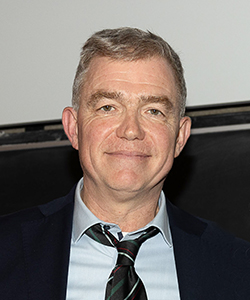US doctor and activist Dr Rupa Marya recently delivered a lecture at Trinity College Dublin, outlining a vision for health that is both radical and practical. David Lynch reports
“We have not been trained to think about whole-systems health,” physician, composer, writer, and activist Dr Rupa Marya told a recent lecture organised by Trinity College Dublin’s School of Medicine and the Faculty of Health Sciences.
Her lecture, titled ‘Farming is medicine: Advancing whole-systems health’, outlined a radical vision for change in medical practice and training.
Dr Marya is a physician at the University of California, San Francisco, US, where she practices and teaches internal medicine, and is co-author of the book Inflamed: Deep Medicine and the Anatomy of Injustice.
Alongside her medical career, she has also found time to tour nearly 30 countries with her band, Rupa and the April Fishes.
Recounting her experience as a musician, Dr Marya said what she learned on the road about people was “fascinating”.
Colonialism
“I started to see that there was this syndrome of diseases, which at that time I called ‘the colonised person syndrome’. Because they [diseases] were overly expressed in people who had lived through colonial trauma and where their societies were still impacted by that trauma.”
With further study in this area, Dr Marya began to focus on how people have lost connection with their ancestral connection with the land and how our bodies have been impacted by a “relationship to power over time”. This includes the effects of colonialism and capitalism across generations.
In her Trinity talk, she particularly highlighted the lasting impact of chronic inflammatory diseases. Dr Marya noted that people from communities “that have been deeply oppressed” have the “highest burden” of such disease.
“We [doctors] have not been trained to think about whole-systems health; we have been trained to atomise and get as small and reductivist as possible.”
While she said it was important that medicine continues to develop an understanding of “precision medicine and the tiny minutiae of molecules and how they interact”, at the same time, “we need to go wider in the other direction.”
Dr Marya said health practice needs to be informed by both the microscopic and macroscopic.
“I share these insights with you as a physician who practices internal medicine, hospital medicine – I say my work puts me at the bleeding edge of society, so I can see who’s hurt and what the breakdowns are. It’s a tremendous privilege to practise medicine in that way. But my medicine really comes from a liberation framework.”
Teachers
She said that her teachers were not only her “professors in medical school”.
“They have also been the people who have come from the most oppressed communities in the San Francisco Bay area and those people are my elders… they really taught me what it means to be a doctor.”
Dr Marya was recognised in 2021 with the Women Leaders in Medicine Award by the American Medical Student Association. She was also a reviewer of the American Medical Association’s Organisational Strategic Plan to Embed Racial Justice and Advance Health Equity.
She founded the Deep Medicine Circle, a women of colour-led organisation committed to healing the wounds of colonialism through food, medicine, story, restoration, and learning. She is also a co-founder of the Do No Harm Coalition, a collective of health workers committed to addressing disease through structural change.
Deep medicine
It is in the Deep Medicine Circle where Dr Marya and her colleagues define ‘deep medicine’ as recognising that “structural problems require structural solutions”.
‘Shallow medicine’ is what she learned in medical school, she told the Trinity audience.
“It does not have the explanatory power that we need. I mean, 60 per cent of heart attacks I see as a doctor are caused by the traditional risk factors, like smoking and high blood pressure. That leaves 40 per cent as something else. And that ‘something else’ can be explained through deep medicine.”
She added that in deep medicine, “we are looking at what are the things around the body.”
“It is locating the pathology not within the body…. You cannot diet and exercise your way out of a planet on fire. We have to look at what is causing that planetary fire and how do we structure the world around us… to invite health to come forward.”
She told the attendees that she now understands health as an “emergent phenomenon, not as a property of one individual”.
In the Deep Medicine Circle, different people are brought together “to look at the problems” caused by the historic and contemporary health impact of colonialism and the profit-based market system.
On a practical level this group is a collective of farmers, lawyers, scholars, economists, artists, Indigenous elders, healthcare workers, botanists, and health students.
We have not been trained to think about whole-systems health
Farming
It also includes ecologists who “work to repair relationships” through the “farming is medicine programme”, an agroecological food systems model that is “having transformative impacts”.
Working in the urban centre of Oakland on a one-acre rooftop farm, and on the rural coast of the peninsula with the Indigenous Ohlone community on a 38-acre farm, the Deep Medicine Circle is building a local food system based in the practices of care.
Through this activism, Dr Marya has principally focused on one major structural challenge – the food system. She noted that the current system leads to serious problems, such as climate change, damaged soils, inequities, food insecurities and vulnerability, fire, and drought.
On Deep Medicine Circle farms, farmers are treated as healthcare workers.
“We pay them as healthcare workers,” she said. “So our farmers get professional development grants, stipends for their [professional] growth. They are also leaders in our community because we believe our health starts in the soil and it’s about how healthy our soil is and how healthy our food is.”
She said the farmers are “leading this work” and medical students visit to learn from them.
The Medical Independent asked Dr Marya whether she believed it was important to incorporate issues of land and agricultural health into medical education.
“Yes, and what is so exciting is that we have the head of the medical school here [at the lecture],” she said, pointing to the presence of Prof Colin Doherty, Consultant Neurologist.
“So will Trinity become the place… that really advances this?,” Dr Marya asked. “To advance planetary human health, to advance ‘web of life’ health?” She added that the question was an urgent one.
Prof Doherty, who had introduced Dr Marya before the lecture, commented that “the gap between the ambition and the execution of something like this, is a really difficult area”, but that it “needs to be done”.
St James’s Hospital
He noted a local example where a painful historical legacy may still have health impacts.

“I work as a doctor in St James’s Hospital, now for 20 years,” he told the Trinity audience.
“I used to hear stories about the history of James’s, which were kind of interesting….Then I started to delve into the real history and it is both shocking and illuminating.”
He said that St James’s was founded as a workhouse in the late 17th Century. Between then and when it closed in 1830, some 127,000 children were registered as entering it.
“We only know what happened to 27,000 of them,” said Prof Doherty. “So some 100,000 children disappeared. About 800-900 a year and we don’t know what happened to them. We suspect they are buried on the site in some place.”
In the context of the issues raised by Dr Marya, Prof Doherty asked “why is that important? I think it is important for a number of reasons. What is the reckoning we have done as a people with that history?…. We now know from the scientific work around epigenetics [that] our genes are affected by the trauma of the past…. And the question is what effect is that having on the city of Dublin now that we had 100,000 children disappear?”
Dr Marya said that she hoped the framework, the practices, and data she outlined may be useful to support struggles for health and healing within Ireland.













Leave a Reply
You must be logged in to post a comment.